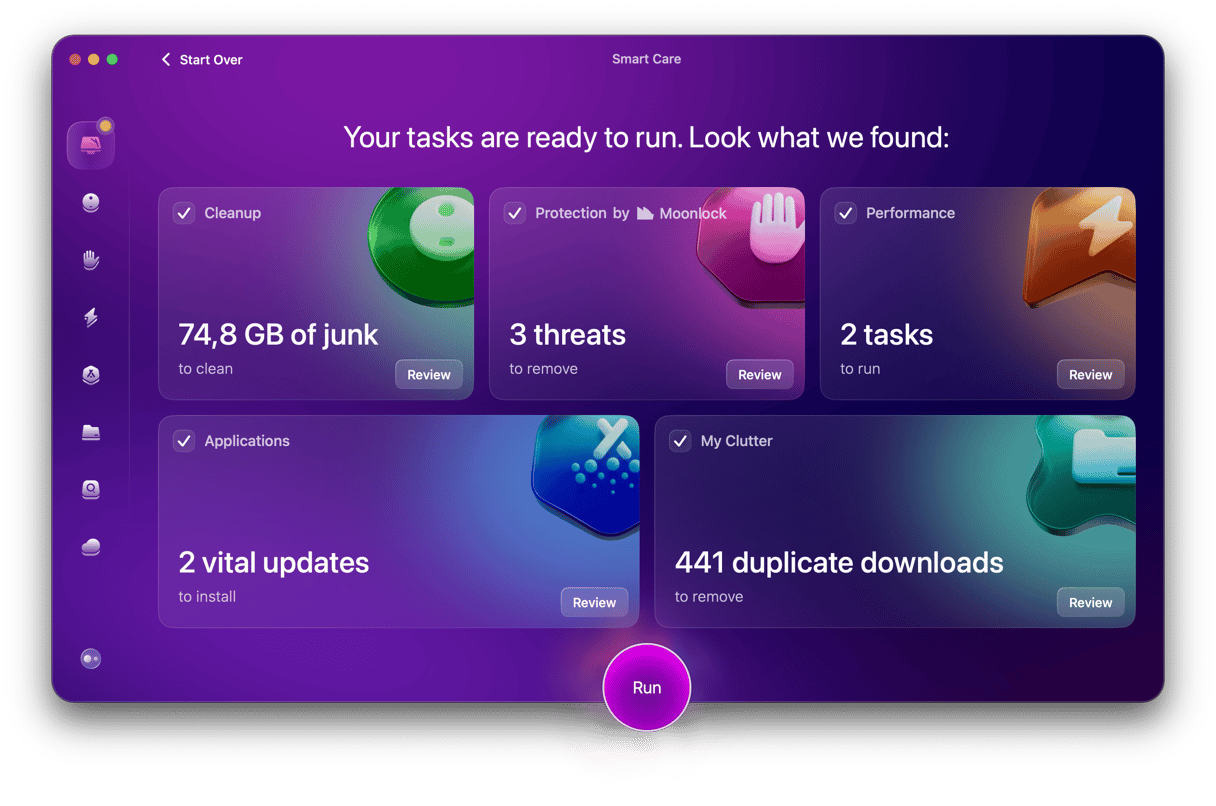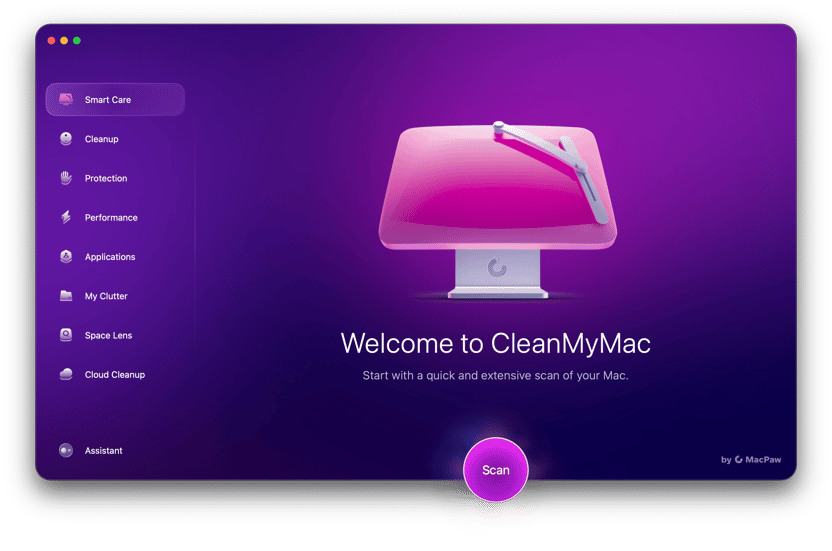There’s a lot of uncertainty surrounding refurbished Mac products, with customers wondering whether they’re going to get a lower quality product than a brand new Mac.
Questions surrounding the efficiency of a refurbished Mac in comparison to new models are consistently at the forefront of customers’ minds, with many still going unanswered. Here is our guide on how to get the best deal on a refurbished Mac, providing you with long-awaited answers to those key questions.
Could I improve my existing Mac?
Before you think about spending your hard-earned cash on a new Mac, why not try to polish up your existing one?
On average, there is a whopping 62 GB of junk found on Macs, with jam-packed caches and folders full of useless documents cluttering the hard drive. Not only does this hinder your own organization, but it also considerably slows down the performance of your Mac, stopping you from getting things done (check out our guide on how to clear cache on a Mac).
CleanMyMac is an app dedicated to cleaning your Mac head-to-toe. It scans everything on the computer, including its system, Mail, Trash bins, and even old folders that have been evading your wrath for years, identifying what needs to be removed.
To clean your Mac, all you need to do is:
- Get your free CleanMyMac trial — test it for 7 days.
- Open the app.
- Click Scan.
- Click Run.

The safe cleanup algorithm (aka the Safety Database) is a list of rules, items, and exceptions that CleanMyMac refers to every time it scans your Mac. As a result, only the junk deemed safe to remove is deleted, ensuring you never lose anything of worth. So, before you part with your dough, be sure to download CleanMyMac to resurrect your existing Mac.
What is a refurbished Mac?
If your current Mac is a lost cause or if you’re looking to buy one for the first time, it’s useful to be clued up on all the available options. Clearly, there’s a lot of discussion surrounding refurbs. But what are they exactly?
A refurbished Mac is a pre-owned product that has been returned to Apple by customers who have either encountered a problem with it — e.g., a faulty pixel on the display of a MacBook Air or a broken USB port on a Retina MacBook Pro — or have simply lost interest in the Mac and returned it. Apple allows any customer to return a Mac bought from the Apple Store within 14 days for a refund.
The geniuses behind the scenes at Apple repair these products, replacing all faulty parts before placing them back on the market through the Refurbished Store, usually at a discounted price. They sell refurbished products that are both current-generation machines and discontinued machines from previous years, but stock fluctuates depending on which products customers return.
How are they tested?
Every refurbished Mac that Apple sells undergoes a thorough certification process that enables marketability. The hard drive, encryption, network connections, displays, ports, and overall productivity are tested on each product, so you can rest assured you’re getting a fully functioning Mac. In addition, with iOS devices, each one gets a new outer shell and a fresh battery, so they’re ‘good as new.’
Apple says its refurbishment procedures use the same basic technical guidelines that are used during its ‘Finished Goods’ testing procedures for retail products. This is outlined in detail on the website help center, but here’s the general gist:
- Each product is tested several times to make sure it is in working condition (e.g., full burn-in testing for displays).
- Defective modules identified during the testing process are replaced with new, functioning parts.
- Current software is installed on the device, and each product ships with its original operating system software.
- Each product is thoroughly cleaned, inspected, and repackaged — including appropriate manuals, cables, and new boxes.
- Apple assigns the product a new refurbished part number and a new serial number.
- The product then undergoes a final quality assurance (QA) check before being remarketed.
Therefore, Macs bought from the Refurbished Store are not discernibly different from new ones bought directly from the Apple Store, suggesting the price savings are worth it.
Price difference
But what exactly are those price savings? The costs for reconditioned Macs change frequently, but typically they’re 10-20% less than the original price. And because Macs command a fairly hefty price tag, it can be quite a difference.
For instance, a 14-inch MacBook Pro Apple M4 Chip with 10‑Core CPU and 10‑Core GPU can be found on the Refurbished Store from $1,359, a $240 saving on the price you’d pay for the exact same model on the Apple Store ($1,499). Normally, the older a machine is, the lower the price will be. On many models, Apple includes the discount percentage and the exact amount saved, but for others, especially older Macs, you will need to calculate the price comparisons yourself.
However, the Apple Refurbished Store’s discounted prices can be trumped by the savings offered from third-party sites. Other resellers, such as Amazon, often offer even lower prices than Apple, so it’s worth shopping around, especially during sales events, such as Black Friday, where prices plummet everywhere asides from Apple.
Warranty and returns procedures
Similarly to the warranty and returns procedure with brand new Apple products, reconditioned Macs come with a 1-year-warranty (extendable to 3 years with AppleCare protection) and a 14-day return limit.
This means if something goes wrong with a refurbished product during the first 365 days of post-purchase, Apple will fix the problem at no extra cost and offer a free replacement. However, when returning refurbished products, you will need to post them back, as Apple do not accept returns to a physical Apple Store on refurbished products. This incurs extra costs and hassle that would be avoided if you were to buy a brand-new Mac.
AppleCare or AppleCare+ can be purchased alongside refurbished products, extending the warranty period. For Macs, purchasing the AppleCare protection plan extends the warranty to a full three years, regardless of the original release year of the machine. Apple will fix any manufacturing issues for free, from broken displays to faulty batteries, giving you full peace of mind.
Buying a refurbished Mac from third-party resellers
There are many other places to buy a refurbished Mac, with thousands of independent shops offering discounts on certified Apple products. However, ensuring that these resellers are, in fact, certified Apple Premium Resellers is imperative in making sure you receive a legit product. By simply providing your postcode, you can find your nearest certified reseller here.
As well as physical resale stores, there is also an abundance of online third-party sites offering huge bargains on Refurbished Apple Macs. Online retailers KRCS offer the complete range of Apple Mac computers, including built-to-order options with free delivery on all orders over $200.
MacConnection is another online authorized Mac reseller offering an extensive selection of refurbished Mac products from 15-inch MacBook Pros to 13-inch MacBook Airs. They offer some amazing deals, such as the $1,299 price for a 13.3-inch MacBook Pro with Retina Display, which is cheaper than the price for the same product on the Apple Refurbished Store.
However, the downside of opting to buy from a retailer other than Apple is that the products don’t come with the same assurance. Because the Macs haven’t undergone Apple’s rigorous pre-marketing testing procedures, post-purchase issues and defects are more likely to occur, causing aggravation that you could do without. In addition, they won’t come with the same warranty that Apple permits and won’t be eligible to receive one year of free support from Apple.
Refurbished machines from third-party stores and sites may come at a much lower cost, but the savings won’t pay dividends should a major problem surface in the near future. If you’re purchasing from a third-party reseller, assess the customer reviews, aim to secure a 90-day or more warranty, and ensure the Mac has undergone an inspection process.
Bottom line
All in all, opting to buy a Refurbished Mac can be an effective approach to buying a new Mac. With enough patience, you can find the exact model you’re looking for from the variety of resellers available at prices considerably lower than retail.
Keep in mind, though, that buying products from online retailers can be fraught with problems, particularly when high-value products like computers are involved. So, buyers must have their wits about them when shopping around to ensure they get the best possible deal from a reliable source.
By purchasing a refurbished Mac directly from Apple, you can save up to a couple of hundred dollars and receive the benefits you’d get with a brand-new Apple product, e.g., 1-year warranty and guaranteed inspection. You may save even more cash purchasing a refurb from a third-party reseller, but approach it with caution, as you often get what you pay for.






